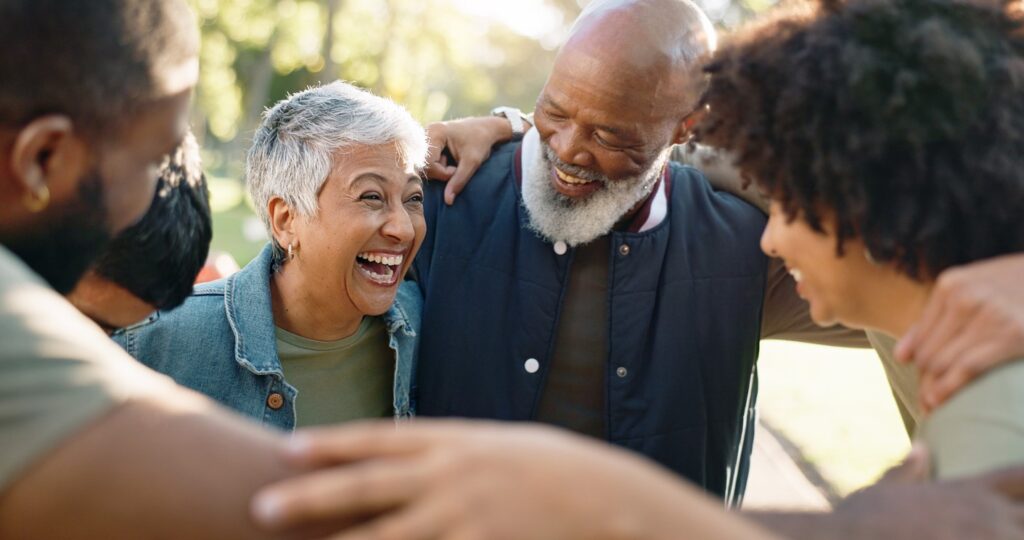Three Self-Care Tips for Seniors and Aging Adults
May 18, 2025

Self-care for aging adults goes beyond physical health, it’s also about relationships, purpose, and joy. Discover practical tips to support well-being and foster meaningful connections in the later stages of life.
While it’s important at every stage of life, our approach to self-care often evolves as we age. For older adults, staying active and eating well remain key, but so does cultivating meaningful relationships and maintaining a sense of purpose. In fact, strong social connections and a feeling of belonging can be just as important to overall health as regular exercise.
Major life changes, such as retirement, relocation, or the loss of loved ones can impact daily routines and reduce opportunities for connection. But with a little creativity and intention, older adults can continue to build and strengthen meaningful relationships, learn new things, and care for themselves in ways that feel truly fulfilling.
Below, you’ll find practical self-care tips and uplifting ideas to help aging adults stay connected, discover new interests, and create a balanced, fulfilling rhythm in daily life. Whether you’re an older adult yourself or someone who cares for an aging loved one, these simple ideas can help support physical, emotional, and social well-being.
1. Build Stronger Social Connections Through Small, Consistent Habits
Connection doesn’t have to be grand or complicated, but it should be consistent. Small, repeatable social rituals can go a long way in strengthening relationships and building a sense of belonging. If current friendships and family ties bring you joy, consider weaving them into your regular routine. Over time, these small gestures add up to deeper, more reliable connections. Here are a few ways to get started:
- Schedule regular, in-person connection points with friends or family. A weekly breakfast, bi-monthly Sunday dinner, or monthly book club gives you something to look forward to and makes reconnecting feel easy and natural. If there’s a show you enjoy watching with new episodes released each week, host a weekly watch party. Even something as simple as a weekly walk with a neighbor can become a cherished part of your week.
- Use technology to schedule daily or weekly check-ins. A quick video chat, a thoughtful email, or even a short text can brighten your day, and someone else’s. Try setting a reminder to reach out to one person each day or designate a specific time each week to catch up with loved ones. Private social media groups or group chats built around shared interests can also help maintain ongoing connection.
2. Find Purpose through Learning, Volunteering, and Creative Activities
Self-care isn’t just about rest and routine, it’s also about staying mentally sharp, embracing curiosity, and challenging yourself in meaningful ways. As we age, it’s easy to fall into familiar rhythms, but stepping outside your comfort zone through learning, creative expression, or community involvement can be deeply rewarding. These opportunities bring energy, purpose, and a sense of accomplishment that are essential to overall well-being.
Here are a few ways to stay engaged and inspired:
- Learn something new. Whether it’s art, writing, gardening, or digital skills, learning keeps the mind active and can introduce you to new passions. Community centers, libraries, and even tech stores often offer free or low-cost classes. If you have grandchildren, ask them to teach you to play a video game or use a new app.
- Volunteer your time or skills. Supporting causes you care about, whether that’s reading to children at your local library, mentoring teens, serving as a docent at a museum, or volunteering at a food pantry, can provide a deep sense of fulfillment. Many communities rely on volunteers to thrive, and the volunteer experience benefits you just as much.
-
- Tip: Explore volunteer opportunities in your area using VolunteerMatch, which allows you to search in your region based on your interests.
- Start a light side project. Starting a passion project, such as tutoring, crafting for a farmer’s market, or blogging about your favorite recipes can spark creativity and maybe even generate some extra income.
- Join an interest-based group. No matter what interests you, there is likely a group of like-minded people in your area who share your passion. Examples include walking, birdwatching, photography, pottery, or gardening. You can find local groups through your library or Meetup.
3. Care for Your Body and Mind with Steady, Regular Habits
Caring for your body and mind is foundational to aging well, and regular, nourishing habits can improve mood, enhance mobility, support independence, and help you stay emotionally resilient. While social connection plays a vital role in your health, wellness starts with how you care for yourself each day. The following practices support physical health and emotional balance, both of which are key to living well later in life.
- Eat to nourish your body – and enjoy the process. As we age, nutritional needs shift—our bodies need fewer calories but more nutrients. Focus on whole, nutrient-dense foods like fruits, vegetables, whole grains, lean proteins (such as chicken, fish, eggs, or legumes), and healthy fats. Stay hydrated and try to limit added sugars and overly processed foods. Cooking with a friend or swapping meals with neighbors can also make mealtimes feel more joyful and less like a chore. Plus, it’s a great way to share new ideas and feel connected
- Move your body in ways you enjoy. Physical activity helps maintain strength, balance, and mental clarity. Choose movement that brings you joy, like walking, dancing, tai chi, or water aerobics. Your local rec center or YMCA likely has offerings specifically designed for older adults, making them a great way to exercise safely and meet other people.
- Make space for mindfulness. Journaling, stretching, or even sitting quietly with a cup of tea can ground you and offer peace in a busy world. Building this into your routine, whether it’s the first thing you do in the morning or the last thing you do before getting ready for bed, can ensure you make space for it each day.
- Listen to your needs. One of the most powerful forms of self-care is listening to your body. Rest when you’re tired. Socialize when you feel energized. Prioritize the activities that genuinely bring you joy, not just what you feel obligated to do.
As we get older, we have great opportunities to reflect, connect, and rediscover what offers meaning and purpose. Whether it’s rekindling an old friendship, starting a new hobby, or simply taking time to care for your body, there are many ways to feel supported and fulfilled at every stage of life.
Take one small step this week toward connection or self-care. Schedule a phone call. Sign up for a class. Try a new recipe or take a mindful walk around the block. These moments add up and they matter in fostering fulfillment in our later years.
Supporting Aging Adults in Denver and Adams Counties
As the Case Management Agency for Denver and Adams Counties, Rocky Mountain Human Services supports aging adults access Long-Term Services and Supports like home modifications, transportation, and personal care. We’re here to ensure every person gets the support that is just right for them throughout their lifespan. Learn more here.






